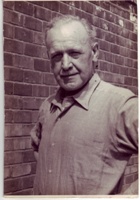
Photograph of Frank in Tameside Local Studies and Archives Centre. Reference: Acc.3444

Military Cross
Frank was born on the 7th September 1895 in Chorlton, Manchester. His father's name was Frank Clement and his mother was Clara. He came from a large family: Samuel, Emily and Arthur were older than him; Reginald and Muriel were younger.
Clement owned a wholesale Tobacco Merchant company, C Benton Ltd, based at 58 Peter Street in Manchester. In 1901 the family lived at 28 Dover Street in South Manchester, but by 1911 they had moved to 36 Stanley Road in Whalley Range, Manchester. Clement had retired and Frank had begun to work as a Tobacconist's Assistant, we believe for his father's firm.
The First World War broke out in August 1914. Frank joined the Army, although we don't know anything about his service until the 2nd October 1915. On this date he was commissioned as a Second Lieutenant. He had held the rank of Sergeant before he became an officer. We don't believe he went overseas during this time.
Frank stayed in the UK training until the 1st March 1917 when he was sent to France to join the 1/6th Battalion of the Manchester Regiment. They were based at Chuignes, near Amiens when Frank joined them. Almost immediately he was sent to the Telescope Sight School to learn how to use this sort of sight to improve his own rifle shooting and to help him train his soldiers.
We don't know very much about the rest of Frank's wartime service. He stayed with the 1/6th Battalion throughout the war, and was promoted to Lieutenant. He later held the rank of Acting Captain.
By October 1918 the British Army was advancing on the Western Front, although the German Army was putting up stiff resistance. It became necessary to cross several strongly defended rivers and canals; one of these was the Selle River. The 1/6th Battalion was one of the units that took part in the attack across this river. Frank played a key part as commander of the battalion's rifle grenade specialists.
Frank's conduct during this attack led to him being awarded the Military Cross. This was published in the London Gazette on the 4th October 1919, with the following citation:
For conspicuous gallantry. During the advance across the River Selle, south of Solesmes, on the 20th Oct. 1918, he was in command of the leading company. When it was held up by very strong resistance, he immediately organised attacks against machine-gun nests and overcame the opposition, gained the first objective, and took about fifty prisoners. He then led his company on to their final objective, displaying excellent leadership, to which the success of the attack was mainly due.
After the First World War the 6th Battalion was reformed as a Territorial Army unit. Its members trained at weekends and during an annual camp. Frank rejoined the 6th Battalion and became the Officer Commanding A Company, holding the rank of Captain. He was a keen rifle shot, and he seems to have passed on his enthusiasm to the whole of A Company.
On the August Bank Holiday weekend of 1922 the 6/7th Battalion (formed by joining the 6th and 7th Battalions together) held a Rifle Meeting for the first time since the First World War. Frank competed for 'The Subalterns' Cup' and was able to shoot well, despite the rain. He scored 71 points, finishing second to his fellow Captain and Military Cross winner William Rainsford Warburton.
When he was not serving with the 6th Battalion we believe Frank returned to work at C. Benton Ltd. He married Muriel Kay between October and December 1918 in Chorlton, Manchester. They lived at 91 Dudley Road in nearby Whalley Range. They had at least 3 children; Lillia between April and June 1920, Dilys between October and December 1921 and Muriel between January and March 1923.
Clement died on the 22nd March 1931 and left his estate to his children Frank, Reginald and Muriel. Frank is described as a 'tobacconist' at this time. He had retired from the Manchester Regiment, but kept in touch with his former comrades by attending Officers Mess Dinners as an Honourary Member.
Frank and Muriel moved to the Stockport area of Manchester at some point, and it was here that Frank died between October and December 1982. He was 87 years old. Muriel died in January 1989 at 92.
As well as his Military Cross, Frank was awarded the British War Medal and the Allied Victory Medal for his Army service.




